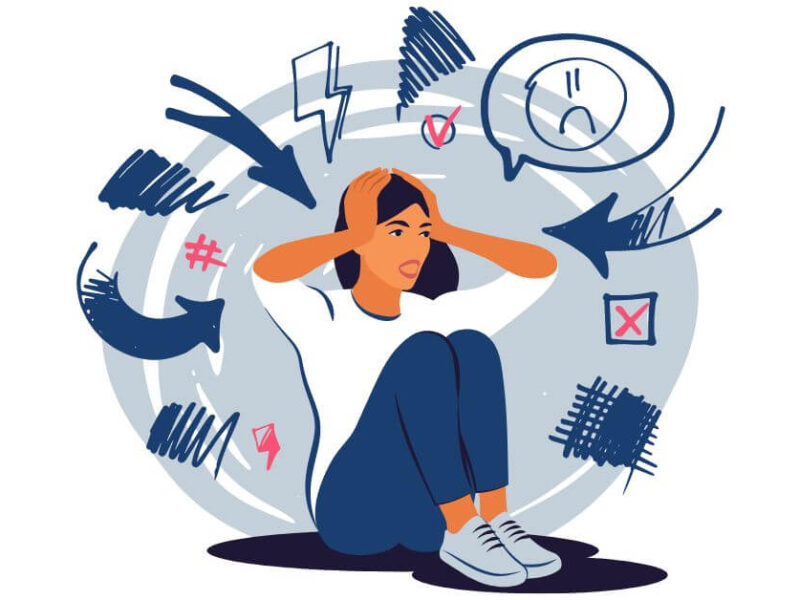Anxiety is one of the most common mental health conditions affecting millions of people globally. Characterized by excessive worry, nervousness, and fear, anxiety can interfere with daily life, relationships, and overall well-being. In today’s fast-paced world, recognizing anxiety and seeking appropriate treatment is more important than ever. Fortunately, advances in mental health care, including therapy, medications, and wellness resources, provide hope for those struggling with this condition.
What is Anxiety?
Anxiety is a natural response to stress and can be beneficial in some situations. It can alert us to dangers and help us prepare and pay attention. However, anxiety becomes a disorder when it becomes overwhelming or occurs without any apparent reason. Generalized Anxiety Disorder (GAD), panic disorder, social anxiety disorder, and specific phobias are some of the major types of anxiety disorders.
Common symptoms include:
- Persistent worrying or fear
- Restlessness or feeling “on edge”
- Difficulty concentrating
- Irritability
- Sleep disturbances
- Rapid heartbeat or sweating
If you or someone you know is experiencing these symptoms regularly, it might be time to consider professional help.
Causes and Risk Factors
Anxiety can be triggered by a complex mix of genetic, environmental, psychological, and developmental factors. Some people may be more predisposed due to family history, while others may develop anxiety from trauma, stress at work or school, financial difficulties, or major life transitions.
Substance abuse, chronic illness, and even certain medications can also contribute to anxiety. It’s essential to work with a healthcare provider to determine the root cause, as this greatly influences the treatment approach.
Treatment Options for Anxiety
Treating anxiety often requires a multi-faceted approach. Some individuals benefit from lifestyle changes alone, while others may require therapy, medication, or a combination of interventions.
1. Cognitive Behavioral Therapy (CBT)
CBT is widely considered the most effective form of psychotherapy for anxiety. It focuses on identifying, understanding, and changing patterns of thinking and behavior. Through regular sessions, individuals learn coping mechanisms, relaxation techniques, and strategies to face fears without avoidance.
2. Medications
Antidepressants and anti-anxiety medications are commonly prescribed for managing anxiety. Among the most discussed are SSRIs (Selective Serotonin Reuptake Inhibitors), such as Lexapro and Zoloft. The lexapro vs zoloft debate often centers around their effectiveness, side effects, and how they interact with other conditions. While both are used to treat anxiety and depression, individual reactions may vary. Lexapro is often preferred for its tolerability, whereas Zoloft may work better for certain types of anxiety.
Additionally, medications like Wellbutrin, primarily used for depression, have shown promise in addressing anxiety in specific cases. The connection between wellbutrin anxiety relief is still being explored, as Wellbutrin affects dopamine and norepinephrine levels rather than serotonin. While it’s not typically the first-line treatment for anxiety, some patients report significant improvement when traditional SSRIs are ineffective or cause unwanted side effects.
3. Therapeutic Services
Access to quality therapy has expanded significantly in recent years, thanks in part to digital platforms. Companies like Therapy Fleet have transformed mental health care by offering online therapy sessions, making it easier for people to access professional support from the comfort of their homes. These platforms match clients with licensed therapists based on specific needs, preferences, and mental health goals.
Lifestyle and Holistic Approaches
While medication and therapy form the cornerstone of anxiety treatment, lifestyle choices can have a profound impact. Incorporating the following habits may enhance mental well-being:
- Regular exercise: Physical activity helps reduce stress hormones and boosts endorphins, improving mood.
- Mindfulness and meditation: Practices like yoga and deep breathing can calm the nervous system and reduce anxiety symptoms.
- Healthy diet: Nutrient-rich foods support brain health. Omega-3 fatty acids, B vitamins, and magnesium are particularly beneficial.
- Sleep hygiene: Quality sleep is crucial for emotional regulation. Establishing a consistent bedtime routine can help.
- Limiting caffeine and alcohol: These substances can exacerbate anxiety and disrupt sleep.
Alternative Therapies
For individuals looking for alternatives to conventional methods, options such as acupuncture, massage therapy, and herbal supplements like ashwagandha or valerian root might be worth exploring. However, it’s essential to consult a healthcare professional before starting any alternative treatment to avoid potential interactions with prescribed medications.
When to Seek Help
While mild anxiety is a normal part of life, persistent or severe symptoms should not be ignored. If anxiety starts affecting your daily activities, relationships, or health, it’s time to seek professional support. Early intervention often leads to better outcomes.
Signs it’s time to seek help include:
- Avoiding social situations due to fear or nervousness
- Constant worrying without specific reasons
- Physical symptoms like headaches, stomach issues, or panic attacks
- Difficulty functioning at work or school
Supporting a Loved One with Anxiety
If someone close to you struggles with anxiety, your support can make a huge difference. Listen without judgment, encourage them to seek professional help, and educate yourself about the condition. Avoid telling them to “just relax” or “stop worrying”—these phrases can feel dismissive. Instead, offer compassion, patience, and practical help when needed.
The Role of Support Groups in Anxiety Management
Support groups provide a safe space for individuals with anxiety to connect with others facing similar challenges. These groups offer emotional support, shared experiences, and practical advice for managing symptoms. Many people find that speaking with others who understand their struggles can be incredibly validating and reassuring. Support groups can be found in person or online, and many are led by licensed therapists or trained facilitators. Joining a group can also help reduce the isolation that often accompanies anxiety, allowing individuals to feel less alone in their journey to recovery.
The Importance of Long-Term Mental Health Care
Anxiety management isn’t just about finding immediate relief; it’s about sustaining well-being in the long term. Consistent mental health care, including regular therapy sessions and periodic check-ins with a healthcare provider, is essential to maintaining progress and preventing relapses. Like any chronic condition, anxiety may require ongoing attention and adjustment of treatment strategies. Building a long-term care plan tailored to individual needs can help ensure that people not only manage anxiety effectively but also thrive and lead fulfilling lives. Establishing a routine that includes healthy coping mechanisms, stress management techniques, and self-care practices can create a foundation for lasting peace of mind.
The Road to Recovery
Recovering from anxiety is not a linear process. There may be setbacks, but with the right tools and support system, healing is possible. Whether through medication, therapy, or holistic approaches, managing anxiety effectively requires persistence and a personalized plan.
The evolving world of mental health care continues to provide innovative solutions. From cutting-edge medications to platforms like Therapy Fleet that bring therapists to your screen, resources have never been more accessible.



